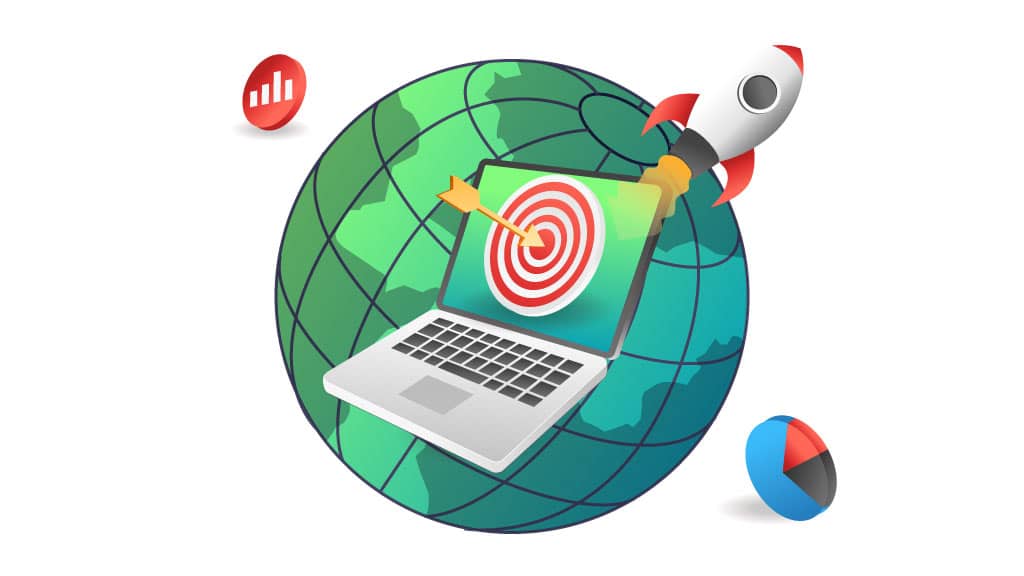These days, companies face a lot more challenges due to international competition. If truth be told, there exist way more opportunities too. Many people are now happy to buy products that come from foreign countries. In order words, marketing is no longer restricted to national borders.
Still, to satisfy the needs and wants of different people from different countries all around the globe, it’s vital you customize your products and your marketing strategies. And that’s precisely what international marketing is all about.
In this post, I’ll explain what international marketing is, the different types available, its advantages and drawbacks, and much more. Not to mention that many people seem to confuse international marketing with global marketing. However, they are not the same thing.
If you want to know what international marketing is, you’re in the right place. In this post, we’ll cover from the basics to the most advanced details. What’s more, we’ll share some tips that will help you beat your competitors by the end.
Sounds interesting?
Let’s get started!
Chapter 1
International Marketing Fundamentals
In this first chapter, I’ll deal with international marketing fundamentals. To begin with, I’ll provide a proper international marketing definition so that you can understand what this complete guide is devoted to.
Afterward, I’ll talk about international marketing participants. And then, I’ll focus on international marketing’s main objectives. Finally, I’ll explain who international marketing is for.
Ready?
International Marketing Definition
International marketing is a marketing approach that implies carrying out your company’s marketing principles in more than one country. It involves planning, promotion, and distribution, among other things. And it aims at satisfying the needs of varied types of customers across national borders.

Therefore, international marketing not only takes place across borders, but it also involves creating unique strategies for each foreign country. And this can not be done without a thorough research process.
International marketing involves customer analysis in multiple foreign countries as well as identifying the target market. Being able to market your products and services to other countries might be unquestionably beneficial for many enterprises. Yet, it also comes with some challenges. I’ll talk about international marketing benefits and drawbacks in more detail later on.
But for now, it’s worth mentioning that thanks to international marketing, you can increase your brand awareness and access to untapped international markets. Not to mention that you may have better profit opportunities in an international market than in your national or even local market.
International marketing implies selling the goods or services of one country in the other/s. But, all this takes place following the rules and regulations of the countries concerned. Besides, international marketing involves understanding and cooperation. It’s an activity that has to be somehow beneficial to all parties affected.
Let’s delve a little deeper!
International Marketing Characteristics
Here are the main characteristics of international marketing:
Access to a large market

Thanks to international marketing, you have access to a broader market. You won’t be limited to a local market in a specific place, region, or country. Different countries can participate and share their products, cultures, and traditions.
Extensive research

Not surprisingly, international marketing requires extensive research to succeed. A company doing an international marketing campaign has to properly research foreign markets, cultures, and potential customers. Otherwise, you might lose a lot of money.
Requires more expertise and exceptional management skills

It comes as no surprise that to make the most out of international marketing, you’ll need a wider competence. You’ll have to handle varied situations, change strategies and adapt to unexpected circumstances. Be ready to put into practice your management skills.
High competition

There is a lot of competition in international markets. You’ll have to compete both with foreign and local brands. Be ready to offer the best deal, great customer service, quality products, customized content, etc.
Needs a different approach for different cultures

You cannot use the same marketing campaign for all countries. International marketing requires you to customize your marketing strategies, advertising campaigns, and even your products to match the needs, preferences, and culture of the country where you pretend to sell your products.
Implies more risk and challenges

One of the complexities of international marketing is that it might imply more risks than marketing your products to your nation. There are political, regional, and cultural differences among countries.
Agreements can change all of a sudden. There might be a war. You’ll depend on the rules and regulations of foreign countries. Thus, it is vital you carry out extensive research so as to make informed decisions.
More common among multinationals and developed countries

International marketing is somehow dominated by multinational corporations since they have a wider reach. What’s more, they have more resources and stability to take part in international marketing.
Still, any brand willing to do so can participate in international marketing. However, you’ll have to compete with multinationals. And that might be a bit challenging at first.
Lots of restrictions

Different countries have different regulations. This means that in international marketing, you’ll have to follow some restrictions. You’d better learn about fixed rules and regulations not to have any problems while doing international marketing.
Requires long-term planning

For international marketing to succeed, you’ll need long-term planning. You’ll probably need a different marketing approach for different cultures. Not to mention that you’ll have to bear in mind political, economic, and social factors. International marketing doesn’t occur overnight.
Time-consuming

International marketing activities are time-consuming. It requires more effort and a certain level of expertise in comparison to national or local marketing. It is more complex due to distance between countries, different payments, rules, regulations, etc.
Need of brand ambassadors

You might need different brand ambassadors for different countries. This will make your marketing more effective. However, it’s more expensive since you’ll have to collaborate with celebrities and influencers from all over the world.
International Marketing Participants
In order for international marketing to take place, there are several major participants involved. They are as follows:
Multinational corporations (MNCs)
Basically, a multinational corporation is an organization that is in charge of the production of either goods or services in more than one country. These organizations tend to have several offices distributed across the nations involved. Not surprisingly, there must be a centralized head office that keeps everything coordinated.
Exporters
The exporters are overseas sellers who trade their products or services to countries different from their own. But following international laws.
Importers
Importers are those who purchase the products or services from exporters. For international marketing to take place, one country has to sell, and another country has to buy.
Service companies
A service company benefits from international marketing since they generate revenue by performing tasks like audit services, keeping track of financial records, and preparing income tax returns, among other things. For example, an accounting company is an example of a service company.
International Marketing Main Objectives
Here are the main objectives of international marketing:
- To improve free trade at a global level.
- To establish new and better trade relations among countries.
- To provide a better life and welfare to people from all over the world.
- To guarantee optimum use and sustainable management of the world’s resources.
- To promote social and cultural exchange among nations.
- To help developing countries in their economic and industrial growth.
- To enhance globalization by means of integrating the economies of different countries.
- To share profits among the countries that take part in international marketing.
- To encourage free and fair trade among the countries of the world.
- To strengthen existing trade relations among nations.
- To achieve the world’s peace through building trade relations across countries.
Who is International Marketing for?
Many people wrongly think that international marketing is only for big enterprises. However, every company willing to internationalize can do so as long as they put into place the right marketing strategy.
If interested, you’ll need to research before making any important decisions. Then, you’ll have to find out how to access external markets. And be aware of the resources you have at your disposal.
Do not forget to design some objectives you’d like to accomplish. And create a plan to put your strategy into practice. Afterward, check whether you reached your goals.
Thanks to technological advances, international barriers are disappearing. Therefore, even small businesses can market their products and services internationally. Yet, success would vary depending on your research and how much effort you put into planning a strategy to succeed in international marketing.
Bear in mind that depending on what you sell, there might be some customs restrictions, as it happens with food. Still, international marketing brings you a new world full of opportunities. You can sell products or services that foreign countries wouldn’t have access to otherwise.
Besides, customers from foreign countries have different buying habits. Thus, it’s vital you discover how to reach them best. Consider foreign cultures’ beliefs and prejudices. And customize your marketing strategies and products to match their needs. Chances are you’ll succeed!
Now that you know what international marketing is, it’s time to move on! In the next chapter, I’ll focus on the types of international marketing. This way, you’ll have a better idea of the possibilities available provided that you want to market your products internationally. Keep reading to find out more!
Chapter 2
Types of International Marketing
In this chapter, I’ll deal with international marketing types. There are many alternatives available. Thus, to select the one that best suits your business, you need to understand each type of international marketing. Then, you’ll be ready to make an informed decision that will allow you to expand your business to other countries.
Export or licensing are usually among the first steps a company takes to implement international marketing in a foreign country. Yet, there are other options you might not have heard about yet, such as franchising, joint venture, and foreign direct investment.
Let’s take a closer look!
Here are the main types of international marketing:

Export
Not surprisingly, enterprises willing to expand their business into new markets start by exporting their products to a foreign country. This is because among all international marketing types, exporting entails the lowest risk.
You can either export directly to target customers or indirectly with the help of foreign sales agents or distributors. Thus, in direct exporting, there’s no third-party involved. A company sells the products they manufacture in international markets.
On the other hand, indirect exporting makes use of international distributors. You can significantly benefit from this type of international marketing since these sales agents know how to make the most out of their own markets. So, it generally traduces in better ROI.
Licensing
Licensing takes place when a company, called licensor, allows a foreign firm to use its intellectual property for a specific period of time. The licensor gets royalties in return for this right.
So, licensing is an agreement between two enterprises. You may want to choose this method if you have a product that another company can license in a large market. This way, both of you will benefit from the contract.
There are lots of ways of licensing intellectual property. Being copyrights, patents, industrial methods, and trade names among the most common. Some well-known licensors are Warner Bross and Disney, for example.
Franchising
Likewise, in franchising, a parent company allows a foreign firm to do business in its name. However, in the case of franchising, the foreign firm has to follow stricter guidelines.
What’s more, licensing tends to be more common among manufacturers. While franchising is more popular among service enterprises, such as restaurants and hotels. Well-known examples of franchising are Coca-Cola and McDonald’s, to name a few.
Franchises are pretty common in North America. Still, they exist all over the world. In order for franchising to succeed, there must be strong brand recognition. This type of international marketing offers you the chance to make money, but it implies indirect management.
Joint ventures
A joint venture is a partnership between two enterprises from different countries. For a joint venture to succeed, it must be beneficial for both parties involved. This is a great way to enter the international market since the risk is shared.
Both companies have to work together. Yet, each one owns the entity to some extent. Besides, both contribute assets. The agreement must be fair to prevent any issues. You’ll probably have heard about Sony-Ericson. It’s one of the best examples of such a partnership.
Joint ventures function as if they were large independent companies. But together, they have the chance to make more money and minimize the risk. When done well, this type of international marketing can be tremendously beneficial.
Foreign direct investment (FID)
Foreign direct investment (FID) refers to marketing operations that take place in a country but are controlled by another country. Therefore, in foreign direct investment, a corporation places a fixed asset in a country different from their own to manufacture a product there.

What’s more, the foreign business owns the subsidiary to the fullest. In other words, it has total control and influences the decision-making process. Mergers, acquisitions, logistics, retail, and services are all great examples of foreign direct investment.
And that’s all for the main types of international marketing. As you may well already know by now, there exist different ways to enter the international market. Which one is best for your company depends on a lot of factors, such as how much money you want to put in or the risk you are willing to take.
Still doubting whether you want to take part in international marketing? Carry on reading! In the next chapter, I’ll cover international marketing advantages and drawbacks.
Chapter 3
International Marketing Advantages and Disadvantages
In this chapter, I’ll devote my attention to international marketing benefits and downsides. As it happens with everything in life, nothing ventured, nothing gained. International marketing comes with its challenges. However, if done right, companies can undoubtedly benefit from it.
Advantages of International Marketing
International marketing can help you increase your sales and profitability. There are lots of opportunities for business expansion. You can significantly benefit from establishing relationships with other businesses worldwide.
The main advantages of international marketing are as follows:
Higher sales
It comes as no surprise that international marketing can help your business to increase your profits. Your company will have more exposure. Consequently, you’ll have the chance to reach a wide number of customers worldwide. International marketing gives you access to a large market. Chances are, you can boost your sales and overall profitability.
Minimize costs
You can reduce the cost of production by producing goods in large amounts. Believe it or not, operations at a large scale help cut down on costs. This is true for both national and international markets. If production costs are lower, you can sell your products at competitive prices. And consequently boost your sales.
Create employment opportunities
International marketing generates lots of employment opportunities both in the home country and in the host country. International marketing requires lots of marketing operations to meet the demands of consumers. Thus, it increases employment opportunities. And you’ll have access to specialized talent that might not be available in your country.
Enhance living standard
International marketing provides a higher standard of living. There exist goods that cannot be produced in some home countries due to geographical restrictions. Still, these same goods might be abundant in other countries. Thus, consumers can purchase high-quality goods unavailable in their home countries.
Special benefits at times of emergency
International marketing can be beneficial for nations facing any kind of emergency situation. There are natural calamities like a drought or flood which require help from other countries. Foreign countries can fulfill the urgent needs of people facing a catastrophe.
Rapid industrial growth
International marketing accelerates industrial growth. It generates demand for new products. New job opportunities, the proper use of resources, and new industrial facilities are needed. All of this contributes to the national economy, which needs to grow quickly to meet the new demands.
Market expansion
One key advantage of international marketing is market expansion. International marketing brings you the opportunity to expand your customer base. Thanks to the variety of communication channels available nowadays, you can market a product internationally without breaking your budget. There’s no doubt that international marketing can help you enhance your brand awareness as well as boost your profits.
Protect against economic downturn
International marketing can help you survive hard times in your home country. In the event of a downturn, you can make up for the money lost in your home country thanks to international markets. Unexpected catastrophes can make a company disappear. But, if you also sell your products overseas, you’ll find survival won’t be bound to your nation’s destiny.
Effective use of surplus production
It is thanks to international marketing that you can make an optimum use of resources. Nations can export whatever they have as a surplus. For example, raw materials, consumer goods, machinery, and services. International marketing allows manufacturers to make use of excess production. It makes marketing more effective.
Facilitate cultural exchange

International marketing makes cultural and social exchange easier. It is not only goods and services what countries exchange. They also share current trends, fashion, and cultural traditions. We could say that international marketing has a say in cultural integration. Customers can enjoy products from other countries. Thus, international marketing is a win-win for all those who take part in it.
Disadvantages of International Marketing
Despite its numerous benefits, international marketing also comes with some downsides. For example, even you have access to a large market full of potential customers, there is high competition. You never know when there might be a war or disagreements between countries. And you must adapt your products and how you advertise them since what’s acceptable in one culture might be offensive in another.
Let’s take a closer look so that you can better understand international marketing drawbacks!
High competition
The degree of competition in international marketing is relatively high since you’ll not only compete with local companies. But you’ll also have to beat international brands. So, companies pretending to enter a foreign market have to bear in mind the degree of competition and offer competitive products or services.
Cultural differences
International marketing might end up being quite challenging due to cultural differences. Each country has a different culture. Besides, countries can have different norms, lifestyles, traditions, preferences, and languages. Thus, you must customize your products to meet your potential customers’ needs and preferences. Otherwise, you may find it challenging to sell your products or services overseas.
Government restrictions
International marketing requires you to follow certain rules and regulations imposed by the host’s country government. Sadly, this can impact the profitability and durability of your marketing operations. Thus, you must familiarize yourself with any government restrictions in the host country.
Distance issues
Another disadvantage of international marketing is that there might be a large distance between nations taking part in the business. Consequently, it implies an extra effort to offer a great service to customers overseas. Also, supplying fresh products to far distance nations can be quite a lot challenging.
War situations
You never know when there’s going to be a war among nations. This can affect international marketing since tension between countries can worsen international relations.
Problems in the host country can lead to enormous losses. There are times when it even means the end of marketing operations abroad. It’s a risk you have to face if you intend to participate in international marketing.
Here is a summary of international marketing advantages and disadvantages:
International marketing benefits:
- Higher sales.
- Minimize costs.
- Create employment opportunities.
- Enhance the standard of living.
- Benefits at times of emergency.
- Rapid industrial growth.
- Market expansion.
- Protect against economic downturn.
- Effective use of surplus production.
- Facilitate cultural exchange.
Disadvantages of international marketing:
- High competition.
- Cultural differences.
- Government restrictions.
- Distance issues.
- War situations.
Now you know the main benefits and downsides of international marketing. It would be wise to consider all the information explained above before deciding to participate in international marketing.
Anyway, many people seem to confuse international marketing with global marketing. In the next chapter, I’ll explain the difference. Keep reading to make sure you understand what these two concepts mean.
Chapter 4
International Marketing vs. Global Marketing
In this chapter, I’ll explain the difference between international marketing and global marketing. Many people use these two terms interchangeably. However, they mean different things. Not sure what I’m talking about? Keep reading to ensure you know their main differences!
What is Global Marketing
Global marketing can be defined as an extension of international marketing. Global marketing is when you use a universal strategy to introduce your brand and products worldwide. Thus, planning, production, placement, and promotion take place using one international approach.
Global marketing is perfect for selling products or services that fit all markets. It’s a great option if you sell a product with universal demand. In global marketing, there is a unified image and a global message that works for different countries.

What’s more, in global marketing, there’s one social media presence through multiple platforms. Thus, you don’t create separate accounts you customize for each country in each platform, but one main account that works for all countries.
Global marketing focuses on reaching the international marketing community. Global marketing is not only for multinational corporations. Anyone with a product/service with universal demand, like smartphones, cars, software, apps, etc., can take part in global marketing.
Thanks to the internet and technological advances, even small companies can reach customers all over the world. All you have to do is convince people your product or service is worth buying. And, let them know you exist.
When interested in several international markets, you must know how to approach them. It’s a common practice in global marketing to have representatives and employees from other countries.
As you might have already noticed, global marketing differs from international marketing. They are not at all the same thing. Keep reading to find out more about their most significant differences.
Top 10 differences between International Marketing and Global Marketing
Global marketing and international marketing may sound pretty similar to many people. These two concepts share the fact that both aim at solving customers’ problems and doing business in cross-border markets. However, they are not the same.
There are some key differences between international marketing and global marketing. Not sure what these are? Do not panic! I’ll help you understand which approach is better for you.
Global marketing focuses on carrying out marketing activities from the company’s headquarter but selling your products/services to different countries from all over the world using the same strategy.
Whereas international marketing runs its marketing strategies by establishing marketing divisions in the local markets of the foreign countries you want to target. This way, you have a closer relationship with your customers.
Here are the most relevant differences between global marketing and international marketing:
Services and products
It comes as no surprise that global marketing strategies aim at marketing the same product overseas. That’s to say; the global marketing approach consists of selling a universal product or offering a service without adapting it for the needs of different customers in each foreign country that’s being targeted.
On the contrary, international marketing aims at customizing products and services to match their varied customer needs overseas, even by creating new products to target the market of each specific country. Therefore, in international marketing, you tailor the product/services for your customers since the same home market product isn’t always the best solution for cross-border markets.
Advertising methods
Likewise, in international marketing, advertising methods are tailored for the local market. Consequently, TV commercials and radio ads vary based on the target audience’s preferences. In international marketing, brands need to develop different content for different countries. This includes using the media channels that their target audience prefers.
However, TV commercials and radio ads are designed to target a global audience in global marketing. There’s a unified message that is used to target potential customers in various countries. Therefore, brands target all markets with the same message in global marketing.
Marketing plans
Not surprisingly, marketing plans differ too. These marketing methods have different goals. Thus, global marketing and international marketing decision-making can’t be the same.
In international marketing, the subsidiary office is in charge of making decisions to grow the business. However, decisions come from the marketing department in the headquarters office in global marketing.

That’s to say; the marketing autonomy is not at all the same. In global marketing, it is somehow limited to the company’s headquarters. Whereas in international marketing, it is spread across several subsidiaries located in different foreign countries.
Marketing personnel
Enterprises that take a global marketing approach usually employ all of their marketing personnel at the company’s headquarter office. However, it’s common that they differ from each other in terms of ethnicity, skills, gender, age, and other aspects. So, global marketing characterizes by having cross-cultural marketing employees that must come up with a universal plan that works for all countries.
On the other hand, brands that follow the international marketing approach either move their marketing employees to foreign countries or hire marketing experts in those foreign countries. The latter is almost imperative since you must have a high level of knowledge of the country being targeted if you apply the international marketing strategy.
Social media
More often than not, one can say whether a company follows a global marketing strategy or an international one based on their social media accounts. This is due to the fact that brands that take the global marketing approach usually have just one account on each social media platform.

On the contrary, enterprises that practice international marketing have multiple social media accounts. What’s more, each account targets a different market in a foreign country. This allows them to customize their marketing message for each market. This way, companies only advertise the products they sell in a specific foreign country without transmitting the information to everybody.
Marketing research and development
Marketing research and development also differ between global marketing and international marketing. Global marketing requires intense market research due to the company’s physical absence in potential foreign countries. Moreover, global marketing performs more shallow but comprehensive marketing research.
On the other hand, international marketing must carry out thorough marketing research and development. The international marketing approach considers specific demands and regional differences to customize the marketing strategy. There needs to be in-depth research and analysis of the different markets. This doesn’t need to take more time than in global marketing since each foreign office is responsible for its own marketing research.
Marketing budget
The marketing budget of a brand that follows an international marketing approach gets divided among the subsidiary offices. This way, they can develop different marketing activities at a local level. Conversely, in global marketing, the marketing budget is financed and has to be approved by the company’s corporate headquarters.
Hierarchy & marketing autonomy
In global marketing, decisions come from the marketing department in the home country. It is the corporate headquarters that make decisions. So, the marketing autonomy is limited to them.
However, in international marketing, the decision-making hierarchy is somehow decentralized. Therefore, foreign offices have more marketing autonomy, and decisions are made based on what’s better for the foreign’s country target audience.
Goal
As I’ve tried to point out before, global marketing aims at applying a single and universal strategy in the market worldwide. On the contrary, international marketing’s goal is to penetrate into specific foreign markets by engaging in the local environment. Thus, however similar they might seem, these two disciplines do not mean the same thing, nor have they the same goal.
Customer engagement
Lastly, customers engagement is present in both approaches, but it is critical for international marketing. For some reason, international marketing seems to generate more engagement than global marketing.
The latter, though effective, has lower customer interactions due to the distance and the fact that the marketing message and channels are unified. However, engagement is pretty high in international marketing because of the local presence and segmented communication channels.
Now you know that global marketing and international marketing are two different concepts. Therefore, you can better choose which method will work best for your business and marketing strategies.
If you want to know more about international marketing, carry on reading! In the next chapter, I’m about to share some international marketing tips that will help you beat your competitors.
Chapter 5
International Marketing Tips
Tapping into a foreign market isn’t as easy as it may seem. Not surprisingly, some risks are involved, and even multinational enterprises can suffer from significant mistakes.
What’s more, effective international marketing can have a big impact. Yet, it’s critical you learn how to take advantage of new opportunities and when and where it’s worth the risk to invest in foreign markets.
Nowadays, we are used to digital commerce and shipping overseas. However difficult it may seem for small businesses, international marketing is not only for big companies. Anyone willing to take the risk can take part.
Just ensure your products/services have international appeal, or in other words, check if what you sell can be marketed worldwide. If the answer is positive, you could expand your business and experience tremendous growth. Sounds challenging? Don’t worry & carry on reading!
Here you’ll find the best tips to avoid pitfalls and help you succeed in international markets:
Find out whether your product/services will travel
Not each and every product/service travels well. Therefore, it’s mandatory you find out whether your product or services will sell overseas without too much customizing. In other words, you need to decide whether you should market your products abroad.
Just because you get occasional orders from foreign customers, it doesn’t mean you should invest in marketing your products on their territories. On top of that, you shouldn’t base your decisions on expectations but on real data. So, the best you can do is to research new territories before trying to sell your products there.
Do thorough market research and assess the market opportunity
Market research is crucial to any marketing campaign. It comes as no surprise that it’s also really important for international marketing. There are lots of aspects you can investigate, such as cultural differences, foreign country’s laws and regulations, economics, politics, demographics, logistics, customer service, and so on and so forth.
Only afterward can you determine whether it’s worth investing in that foreign market. That’s to say, you must assess the market opportunity. Find out about competitors, potential trade restrictions, your product demand, etc. This will help you determine the best time to launch a campaign, for instance.
Consider the cost and resources you need for the expansion
Since entering markets overseas might not be that cheap, it would be wise you consider all costs associated before embarking yourself on such a marketing method. You must take into consideration factors like shipping costs, travel expenses, foreign taxes, hiring new employees, translations, and legal expenses, to name a few.

You might be wondering whether you can afford such an investment. It is for this reason that international marketing is somehow easier for multinational corporations since they have a lot more budget. However, small businesses can also take part. All you need is a lot of planning and research to make sure you don’t waste your budget on unnecessary issues.
Adapt your marketing plan and strategies
International marketing is a bit more complex than domestic marketing. This means that if you have a product you want to sell overseas, you’ll need to adapt your strategy. There exist lots of factors that can affect your marketing plan, such as a different language, customs, local values, aesthetics, etc.
Thus, your plan and strategies might need some adaptation to match your target audience’s needs. International marketing not only requires research, commitment, and resources. It also requires different strategies. What works in your home country might not work overseas.
Build up your global SEO
Developing global SEO is a long-term strategy you can significantly benefit from. In all likelihood, international marketing will force you to have more than one version of your website. I mean, different language versions to target different countries overseas.
Consequently, to maximize your SEO, you could benefit from canonical links so that search engines like Google know about the other versions of your site. This way, these won’t be taken for duplicate content. Investing in your global SEO is highly recommended, if not critical.
Create an excellent first impression
It comes as no surprise that trustworthiness is something that is established from the very beginning. Therefore, you must create an excellent first impression. No matter whether you sell products or services, you must first seduce your potential clients and sell afterward.
You need to create interest and later persuade them what you sell is what they need. Catching your target audience’s attention is critical to success. A positive first impression is pivotal to establishing future relationships. Ensure you provide an attractive image and convince them right from the start.
Work with locals & learn local customs
Learning local customs and collaborating with local partners can make or break your expansion into international markets. Not surprisingly, collaborating with local distributors and working with local agents will ensure your marketing methods have a local appeal.
What’s more, you must research cultural differences and learn the language, or at least translate your content into it so that locals can understand your message. What works in one country may not be as effective in another. Thus, make sure you learn local customs and follow your target audience’s preferences.
Adjust your media mix to foreign countries
Interestingly, there’s no need to use the same marketing channels in all foreign countries you’re interested in to market your products/services. You can significantly benefit from adjusting your media mix to your target audience’s needs.
You might need to rely on social media and online advertising in some countries. In contrast, you may need to use local newspapers, TV commercials, or radio stations to reach potential customers in others.
On top of that, you may need to create multiple language versions of your website. The same is true for your social media accounts. People prefer content in their native language.
Not everybody speaks several languages. Yet, this is time-consuming and needs some of your budget. So, you’d better ensure it’s worth the effort. I mean, it’ll depend on how many business operations you do with that foreign country.
Invest in creating relevant content
Likewise, you can either translate content or create new content for a particular country. Whether it’s blog posts, YouTube videos, podcasts, or image galleries, you must make sure they match your target audience’s preferences.

The same is true for emails, social networks, apps, etc. Ideally, all your content needs to be relevant to your target audience. Content creation is one of the best ways to convert users into customers.
If done well, it’s one of the most effective business strategies. Consequently, we strongly advise you to adapt your content and make it relevant for each region you want to target.
Exhibit overseas
Provided that you’re planning to take part in international marketing activities, you could take a stand at some trade shows abroad. A bit of initiative is always welcome. Who knows? You could meet people and make interesting contacts who can later help you launch a successful marketing campaign.
Besides, it’s a great opportunity to spy on whatever it is that your potential competitors are doing. Trade shows are tremendously enriching, and attending a few can help you with your first sales as well as get a bit of knowledge.
Make sure your message and ideas translate well
Marketing teams need to go hand in hand with translators. Transcreation works wonders for computer games and filmmaking, among many other fields. You could also benefit from using it for your international marketing activities.

To persuade users to become consumers, you must come up with the right message. There might be loads of occasions when a message can be misinterpreted. To avoid intercultural blunders, you can hire expert translators and make them collaborate with marketers.
Ensure your marketing framework is sustainable and scalable
Your marketing framework must be sustainable and scalable. There needs to be some consistency. This can help you with both new and existing markets. You should follow a marketing program. There needs to be some organization. This way, people will know what is expected of them. So, they’ll work more efficiently.
If truth be told, you may benefit from using some strategies here and others there. Yet, there needs to be consistency as regards marketing responsibilities. This way your marketing plan will be more efficient. Not to mention that expanding or growing your business will be more organized. Thus, somehow easier to assess and optimize.
Hopefully, these international marketing tips will help you succeed. Remember that in international marketing, there is no one size fits all solution. What strategies to carry out will depend on your business, the products or services you market, and the markets you want to penetrate into.
Above all, the best advice we can give you is to do research and make informed decisions. Otherwise, chances are you can make mistakes you could have avoided. Besides, bear your target audience preferences always in mind and customize both your message and products.
Conclusion
International marketing can help you grow your business overseas. Make sure you know the difference between global marketing and international marketing and follow the approach that best suits your brand.
Many small businesses are afraid to take part in international marketing. However, as I mentioned earlier in this post, international marketing is not restricted to multinational companies; anyone can take part.
Thanks to the internet, it is easier than ever to promote your products or services online. Ensure you know the rules and regulations and whether what you sell can be marketed in other countries.
Now we’d like to hear from you:
Have you got any questions about this post?
Is there anything important I forgot to mention?
What method do you think is best, global marketing or international marketing?
What international marketing strategies do you use?
Leave a comment below to let us know what you think!

In this competitive online market these tips are very helpful.thanks for your informative tips.
Thanks for your explanations for the difference between the international marketing and global marketing. please send me more information about international marketing.